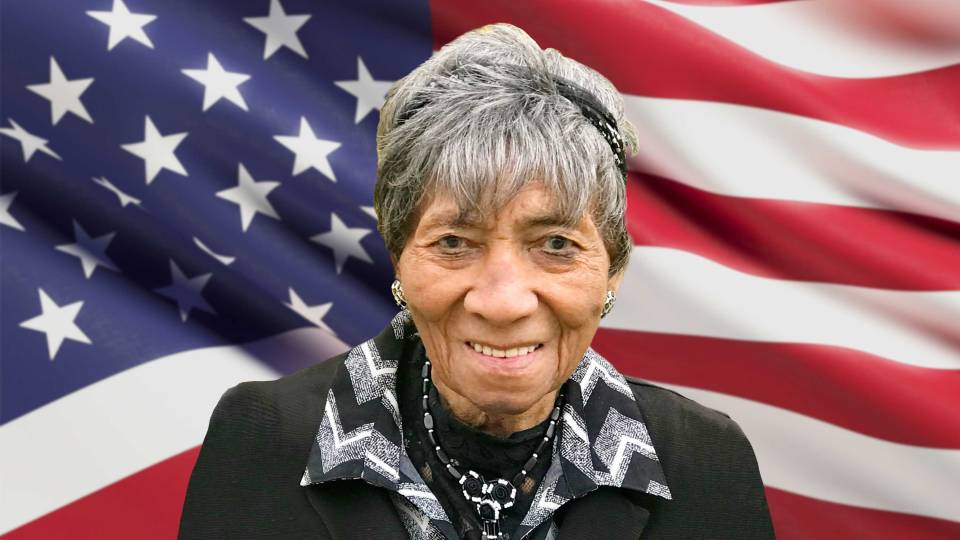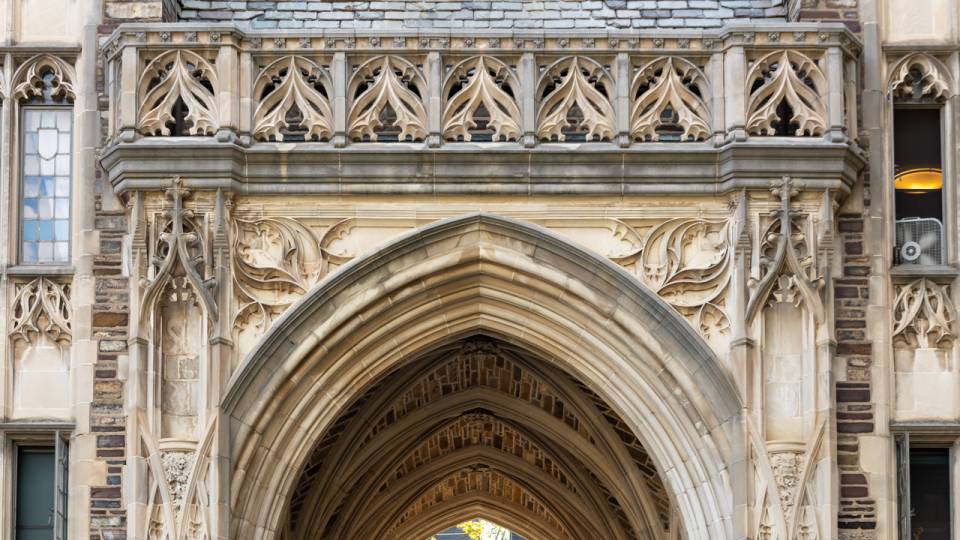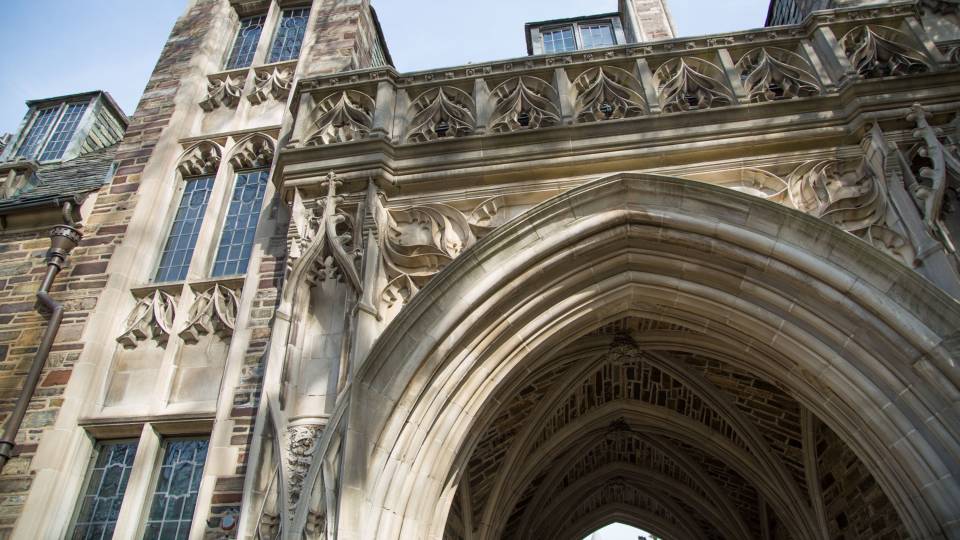University, state, county and local officials, along with family, friends, faculty, staff and students attend the dedication of Laura Wooten Hall on Oct. 26. President Christopher L. Eisgruber (right) shakes hands with Caasi Love (left) after the ribbon-cutting ceremony. Love, assistant director of finance and planning for the School of Engineering and Applied Science, is Wooten's grandson and among the many family members at the event.
Laura Wooten Hall was officially dedicated on Princeton’s campus Oct. 26 during a joyful ceremony that brought together state, county and local officials with Wooten’s proud family, friends, faculty, staff and students.
The naming honors the longtime election poll worker’s “extraordinary contributions to our nation and the democratic process,” as inscribed on a new plaque on the brick building located along Washington Road. The name “Laura Wooten Hall” appears prominently above the building’s entrance.
Wooten volunteered at local, primary and general election polls in New Jersey for 79 years and was recognized as the longest serving election poll worker in the United States. A former resident of Princeton, New Jersey, and a Campus Dining staff member for more than 27 years, she died in March 2019 at age 98.
“Laura Wooten’s story offers a powerful example of the positive impact that one remarkable person can have through lifelong dedication to public service and civic values,” President Christopher L. Eisgruber said during the event. "We hope that generations of Princetonians are inspired by the story of her extraordinary contributions as they explore ways that they too can serve our nation and humanity.”
Wooten’s daughter Yvonne Hill said the building naming is an honor that will ensure her mother’s legacy lives on. She called Wooten the moral compass for the honoree’s children, grandchildren and great grandchildren.
“Some might say that she was a shining example of how ordinary people can do extraordinary things and make a difference, but to us she was an extraordinary person who did what she believed was ordinary,” Hill said, speaking on behalf of the Wooten family. “Through Laura Wooten’s story, generations of families, communities and students may be inspired to become world changers just by doing their part. Princeton University students and staff may now enter the doors of Laura Wooten Hall recognizing that they too can ignite change.”
New Jersey recently enacted “Laura Wooten’s Law” focused on civics curriculum guidelines for middle schools to ensure that students understand the principles underlying the American system of constitutional democracy and the role of a citizen in a democratic society.
A legacy of “mighty work for so many years”
Wooten was born in Goldsboro, North Carolina, on Dec. 19, 1920, the same year women’s right to vote was ratified in the U.S. She moved to Princeton as a young child and began volunteering at the polls after graduating high school in 1939. Wooten never missed an election, Hill said, even in 2017 when Wooten’s beloved brother died the day before Election Day and she had to walk to the polls at 4 a.m. due to a mix up with her ride.

Wooten's daughter Yvonne Hill speaks at the dedication of Laura Wooten Hall on Princeton's campus. Hill said "Princeton University students and staff may now enter the doors of Laura Wooten Hall recognizing that they too can ignite change.”
“For 79 years, Ms. Wooten provided an unbelievable service,” New Jersey Assemblywoman Verlina Reynolds-Jackson said, adding that she was grateful to the University for recognizing Wooten’s civic service in such a prominent way on campus. “Princeton University continues to be a leader in removing barriers,” Reynolds-Jackson said.
U.S. Rep. Bonnie Watson Coleman and New Jersey state Sen. Shirley Turner, who co-sponsored “Laura Wooten’s Law,” both said Wooten’s life story exemplifies how every person can contribute to our democracy.
As a Black woman born in the segregated South and educated in Princeton at a time when public schools were segregated, Wooten observed many barriers aimed at preventing people of color from voting, noted Watson Coleman.
“No matter what, she never lost sight of her commitment,” Watson Coleman said. “Through her mighty work for so many years, she showed you the value and the legitimacy of the power of the people.”
Mayor of Princeton Mark Freda called Wooten a symbol of how democracy should work. “The message she sent to everyone is that voting is important, participation is important, overcoming challenges is important, and you do have a voice when you vote,” Freda said.
[Note: The Oct. 26 event was a non-campaign event and Princeton University does not endorse, support or oppose any candidates in any upcoming election.]
“Steadfast, wise and virtuous action”
The University announced last summer that Marx Hall would be renamed Laura Wooten Hall as of July 1, 2022. The building houses the University Center for Human Values as well as other academic spaces. The Board of Trustees approved the renaming following the recommendation of the Council of the Princeton University Community (CPUC) Committee on Naming, which is made up of faculty, staff, student and alumni representatives. Since 2016, the University has named many buildings and spaces with input from the CPUC Committee on Naming in an effort to diversify campus iconography and namings.

The new plaque on Laura Wooten Hall reads, in part, that Wooten's 79 years volunteering at election polls "stands as a testament to the positive impact that one remarkable person can have through lifelong dedication to public service and civic values."
Melissa Lane, director of the University Center for Human Values, said Wooten was beloved by many students, faculty and staff and she will always be remembered.
“Through her steadfast wise and virtuous action, year in and year out, Laura Wooten made herself into one of the most powerful educators on our campus,” said Lane, the Class of 1943 Professor of Politics. “Seeing her name inscribed on this building challenges us all, each and every day, to lift our sights.”
Brendan Kolb, a graduate student in philosophy who often works in Laura Wooten Hall, called the naming "a touching tribute.”
Before the ceremony began, Keoke Wooten-Johnson, one of Wooten’s many grandchildren, posed for photos wearing a sweatshirt embossed with her grandmother’s signature. “This is surreal. I’ve been crying happy tears all week,” Wooten-Johnson said. “If my grandma were alive, she would say everyone who showed up for the ceremony today better also show up and vote.”
The dedication ceremony began with a moment of silence for Class of 2024 member Misrach Ewunetie. In his introduction, Eisgruber recognized Ewunetie’s tragic loss and the week of mourning that has followed on campus. “In moments like these, the opportunity to gather as a community feels especially meaningful,” Eisgruber said.







